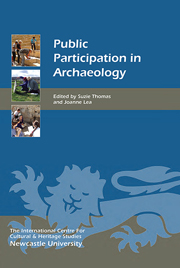Book contents
- Frontmatter
- Dedication
- Contents
- List of Illustrations
- Acknowledgments
- List of Abbreviations
- Preface
- Introduction
- Public Participation in Archaeology: International Models
- Public Participation in Archaeology Through Education
- Public Participation in Archaeology Through Tourism
- 10 Politics, Archaeology and Education: Ancient Merv, Turkmenistan
- 11 Situating Public Archaeology in Crooked Tree, Belize
- 12 Access to Archaeological Heritage in Mexico: Its Impact on Public Participation in Archaeology
- Public Participation in Archaeology Through Site Management and conservation
- List of Contributors
- Index
12 - Access to Archaeological Heritage in Mexico: Its Impact on Public Participation in Archaeology
from Public Participation in Archaeology Through Tourism
Published online by Cambridge University Press: 05 August 2014
- Frontmatter
- Dedication
- Contents
- List of Illustrations
- Acknowledgments
- List of Abbreviations
- Preface
- Introduction
- Public Participation in Archaeology: International Models
- Public Participation in Archaeology Through Education
- Public Participation in Archaeology Through Tourism
- 10 Politics, Archaeology and Education: Ancient Merv, Turkmenistan
- 11 Situating Public Archaeology in Crooked Tree, Belize
- 12 Access to Archaeological Heritage in Mexico: Its Impact on Public Participation in Archaeology
- Public Participation in Archaeology Through Site Management and conservation
- List of Contributors
- Index
Summary
Introduction
In Mexico, and particularly in the state of Quintana Roo on the Yucatan peninsula, archaeological heritage has a solid presence in the lives of the public. Although not strong, the relationship, interaction and participation of the public with its archaeological heritage are being encouraged in several ways, through pedagogic initiatives, government—private industry alliances, heritage tourism and online dissemination, including social networks. The purpose of this chapter is to illustrate the initiatives undertaken to promote access to archaeology, paying particular attention to heritage tourism, which is not only an important revenue generator for archaeological conservation but also a medium for public education and heritage interpretation. Each of these avenues of access to Mexico's archaeological heritage has positive and negative impacts but they are ultimately the way forward for Mexican archaeology. This chapter commences with a brief description of the National Institute of Anthropology and History (Instituto National de Antropologia e Historia in Spanish and referred to hereafter as INAH), the organisation in charge of archaeological management in the country, followed by initiatives that have promoted Mexican public participation in archaeology.
Archaeological Management in Mexico
The National Institute of Anthropology and History (INAH) is the federal agency in charge of researching, conserving and promoting the national archaeological, anthropological, historical and paleontological heritage of Mexico. Specifically, it sets regulations with regard to the conservation and promotion of Mexico's tangible and intangible cultural heritage. With a staff” of 300 permanent and 500 temporary archaeologists, INAH's National Coordination of Archaeology oversees 29,000 registered archaeological sites throughout the country, 187 of which are open to the public (INAH 2013).
- Type
- Chapter
- Information
- Public Participation in Archaeology , pp. 139 - 146Publisher: Boydell & BrewerPrint publication year: 2014



